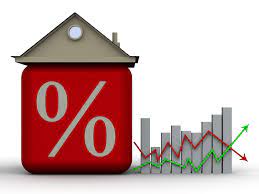Why has your bank not reduced your home loan interest?
Housing loan providers, like as banks and finance businesses, are fast to raise interest rates whenever the RBI announces a rise in its monetary policy rates. When the RBI lowers the interest rate, however, these lenders never display the same efficiency.
Borrowers may think it's unethical, but lenders want to earn more and profit more. The point is, why do authorities look the other way when lenders engage in unethical behaviour?
To begin, we must recognise that there are two sorts of lenders who offer house loans. The National Housing Bank regulates banks authorised by the Reserve Bank of India (RBI) as well as finance businesses such as HDFC and LIC Housing Finance (NHB). Fixed and floating interest rates are offered by banks and housing finance businesses on house loans.
The interest rate on a fixed rate loan is fixed either for the full loan term or for a portion of the loan term. The borrower must study and comprehend the reset clause if it is fixed for a portion of the loan term.
The interest rate on a floating rate loan fluctuates with market interest rates. When the market rate rises, the EMIs (equivalent monthly instalments) rise with it, and vice versa. Borrowers, on the other hand, frequently discover that, despite falling market rates, their EMI has stayed same.
The index and the spread are two components of the floating interest rate. The index is a measure of interest rates in general (based on the prices of government securities or prime lending rates, for example) (BPLR). The spread is a sum added by the lender to account for credit risk and profit margin. The amount of the spread varies from one lender to the next, although it is usually consistent throughout the loan's term. In most cases, if the index rate rises, so does the interest rate, and the borrower would have to pay a higher EMI. In the event that the interest rate falls, the EMI amount should fall as well. Despite a rate jump, lenders frequently maintain the same EMI while lengthening the payback time. However, the borrower should confirm this with the individual lender.
For the first time since May 2013, the RBI cut the repo rate by 25 basis points to 7.75 percent in January 2015. Since January 2014, the central bank has kept the benchmark interest rate at 8%. Despite the borrowers' high expectations, lenders' interest rates remained relatively unchanged.
This occurs as a result of the RBI's decision to allow banks to establish their own interest rates. "Banks may, with the consent of their Boards, establish the rate of interest, taking in mind the magnitude of accommodation, degree of risk, and other relevant considerations," the RBI said in a master circular released on July 1, 2014.
The Reserve Bank of India recently announced that banks can review their base rate computation formula after three years instead of five. The asset liability committee (ALCO) of each bank is expected to make a decision on the base rate formula, which was last determined in 2010.
Despite the RBI's cut, bankers continue to blame the higher average cost of funds, or incremental cost of funds, for not lowering home loan interest rates. When the Federal Reserve lowers interest rates, lenders lower their deposit rates first, then lower their base rate once their average cost of funding falls. Another reason why lenders are hesitant to lower their base rates is that doing so would harm a large portion of their loan portfolio and, as a result, their balance sheet (read profit). Most banks base their benchmark rates on the preceding quarter's average cost of funds.
Conclusion
There's no need to be discouraged if your personal loan application is turned down. To boost your chances of loan approval, simply work on improving your credit report and following the methods outlined above. Once you've completed this checklist, you're ready to submit your personal loan application.To find about the best pricing and deals, call our toll-free number +91-9477079053. They'll help you in every way they can. Please contact me at Best Home Loan In India if you have any more.



Comments
Post a Comment